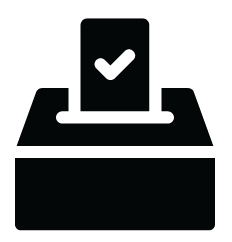download the brief
Key Findings






The Carsey Perspectives series presents new ways of looking at issues affecting our society and the world. Any opinions, findings, and conclusions or recommendations expressed in this material are those of the authors and do not necessarily reflect the views of the sponsors or publisher.
In the spring of 2021, the Carsey School of Public Policy at the University of New Hampshire published the 2020 New Hampshire Civic Health Index (CHI).1 The CHI measures variables associated with civic health, including how residents engage with their communities, trust and interact with each other in neighborhood and municipal settings, and participate in public life through voting and attending meetings, with an eye toward the ways that different demographic groups participate (or not) in public life. This perspectives brief will focus on the matter of trust, which the National Civic League has identified as a key ingredient of strong democracy. A core assumption is that democracy depends on trust. Erosion of trust in democratic societies has negative effects for individuals, communities, and public participation in political and civic matters. An additional claim, supported by multiple analyses, is that levels of trust in the United States have been declining steadily over the past few decades, exacerbated in recent years by the global pandemic as well as increasingly stark political and social divisions.
Why Trust Matters
Trust is a robust social and psychological construct, encompassing interpersonal behaviors and judgments as well as cultural, political, and economic factors. A 2022 discussion of trust in the context of the Covid-19 pandemic, published in The Lancet, provides a helpful definition of trust for our purposes:
Trust is a shared resource that enables networks of people to do collectively what individual actors cannot. It can be fostered in between crises through sustained investment. Previous research has assessed that trusting relations affect health outcomes through various forms of social capital, including bonding social capital (among networks of people who consider themselves to be similar), bridging social capital (among members of a network who perceive themselves as differing by age, racial or ethnic group, class, or other sociodemographic characteristic), and linking social capital (across power or authority gradients such as the relationships between people and their law enforcement, health-care providers, medical researchers, or bankers).2
Trust and trustworthiness are necessary and foundational components of both bridging and bonding social capital. In addition, linking social capital, which refers to vertical relationships among institutional structures that hold formal authority (e.g., how nonprofit organizations are governed by state laws and regulations) depends on trust between community leaders and elected officials.
Three Dimensions of Trust
We can think of trust as existing across three dimensions—social, civic, and institutional. By nature, these dimensions are interdependent and overlapping.
Social trust is founded on a belief in the honesty and reliability of others to be responsible and civil neighbors or fellow members of a community. Social trust can be exemplified in resident-owned communities, roadside farmstands using the honor system for payment, interfaith networks, or neighborhood crime watches. These tend to be voluntary, loosely organized, often informal initiatives to address specific challenges in a particular locality.
Civic trust is concerned with faith in the authority and competence of governing institutions to act in ways that are transparent, effective, and in the best interests of the common good. Civic trust can be evidenced in more formal municipal or community settings such as planning boards, school boards, conservation committees, service organizations (such as the Rotary or Lions), guilds, or community development efforts such as Main Street, USA. Participation is typically voluntary and uncompensated, sometimes through election or appointment.
Institutional trust (sometimes referred to as public trust) is associated with formal bodies including the three branches of government, police departments, schools, health care systems, news and social media, and corporate entities such as banks. Participants typically have some degree of representative or delegated authority and are compensated in some manner. In this light, “Public trust can be defined as the extent to which citizens trust the government to do what is right, to do it honestly, to do it fairly and to do it efficiently.”3
What do we know about levels of trust and trends over time?
Relevant findings about social, civic, and institutional trust come from the New Hampshire Civic Health Index (and its counterparts conducted in numerous states and large municipalities in collaboration with the National Conference on Citizenship), the Pew Research Center, the Gallup Poll, the Edelman Trust Barometer, and related local, state, and national surveys. All these sources demonstrate declining trust levels over the past several decades.
In the 2020 New Hampshire CHI, we found:
- From 2001 to 2019, the share of Granite Staters who “usually” or “always” trust the national government fell from 30% to 14%. In 2019, 40% of residents reported that they “hardly ever” trusted the national government. About half of all those who do not trust national government also report that they do not vote in national elections.
- From 2001 to 2019, trust in local government among New Hampshire residents fell from 52% to 44%, certainly stronger than trust at the national level but part of the general downward trend.
- Higher levels of education correlate with higher levels of trust in government and higher levels of voter participation.
- Trust in local news media is inversely correlated with age—for instance, 18–34 year olds trust media much less than older cohorts. Higher trust in local media is also linked to higher education.
- New Hampshire residents’ trust in their neighbors has also fallen over the past 18 years. While most residents (89%) trusted their neighbors a lot or some in 2001, that number decreased to 79% in 2019. Fewer than half of New Hampshire residents reported they trust their neighbors a lot. There was a 5-percentage point increase from 2001 to 2019 in New Hampshire residents who do not trust their neighbors at all.
These trends align closely with national survey data. While the New Hampshire data were collected prior to the watershed year of 2020 (i.e., Covid-19, the murder of George Floyd, the presidential election and its aftermath), more recent data demonstrate continuing declines in trust. In the fall of 2023, the Gallup Poll reported that only 37% of respondents trust the federal government to “handle domestic problems” (less than the 44% who trust it to “handle international problems”). Only 32% trust Congress, while slightly higher numbers trust the executive and judiciary branches. Yet, as in New Hampshire, trust in local government surpasses trust in national government; two-thirds of Americans trust local government “a fair amount” or “a great deal.”4
The Pew Research Center report on Public Trust in Government, 1958–2022, shows significant declines in institutional trust over six decades. Early in that period, about three-quarters of respondents expressed trust in the national government to “do the right thing always or most of the time.” Since 2007, trust in the national government has not exceeded 30%. Further, trust levels vary with ethnic and racial identity. About one-fifth of Black, Asian, and Hispanic respondents trust government, compared with 13% of white respondents.5
As the 2022 Edelman Trust Barometer puts it, “Distrust is now society’s default emotion. Nearly 6 in 10 say their default tendency is to distrust something until they see evidence it is trustworthy. Another 64% say it’s now to a point where people are incapable of having constructive and civil debates about issues they disagree on. When distrust is the default—we lack the ability to debate or collaborate.”6
What do these trends mean?
Trust is a necessary and fundamental component of social capital.7 Given that strong social capital is one measure of civic health, we can say that the body politic is under the weather and increasingly feeling poorly. In a pluralistic democracy such as ours (the most diverse democracy in the world), the presence or absence of trust—social, civic, and institutional—is a key indicator of the health of our democratic system. At the local, state, or national level, governments and other less formal entities that create rules enabling peaceful co-existence must engender and foster trust.
Trust building takes effort. As Archon Fung has written, for governing structures to garner trust, they must be effective, legitimate, and committed to advancing social justice.8 Manifesting these qualities requires transparency as a means to accountability as well as public access to information necessary for meaningful participation in decision-making. It also means assuring that all community members have equitable access to information, governance processes, and a seat at the table. Everyone must feel like they and their voices matter in their own communities and beyond. In this light, examples of trust-building practices include citizen oversight commissions for law enforcement, more deliberative and participatory public meeting practices, and citizen academies such as those proposed by the Center for Public Leadership and Governance.
Those who are discriminated against as a function of education level, income, age, gender, racial or ethnic identity, ability, or other marginalized attributes are less likely to trust those beyond their immediate circles. In the highly polarized, tribal, divisive times we are experiencing now, a sense that one doesn’t matter and that those elected and appointed to represent our interests are not to be trusted can lead to at least two outcomes. We can give up and walk away from the system, leaving it to others to run such as happens when people choose not to vote. Or we might decide to confront the system, including through violent means (such as January 6, 2021).
What might be done to strengthen trust?
One response to the challenges pointed out here is to adopt a mindset of abundance rather than limitation. Trust is not a fixed quantity to be lost or gained. As Rachel Botsman puts it, “We are not losing trust; what has happened, I think, is that who we trust has changed. It’s much more helpful to think of trust as energy: it doesn’t get destroyed, it changes form.”11
In this light, we can understand that trust is easier to create and sustain among those closest to us (physically and socially) and more difficult when we are asked to trust those with whom we don’t interact and whose actions and motivations are not transparent. Botsman’s idea that trust in strangers (such as Uber drivers) may be eclipsing trust in institutions12 may be plausible, but it is troubling for those of us working to strengthen democratic institutions necessary to hold the union together. Perhaps at the transactional level, it’s easier to trust strangers (when we click on the Uber link). But at the community level, where decisions are made by elected or appointed actors on behalf of everyday people, or at the more distal level in state capitals, courtrooms, or boardrooms, a lack of familiarity and a sense of disenfranchisement can perpetuate feelings of alienation and suspicion. Without the opportunity for face-to-face deliberation, critique, or curious conversation, we can easily demonize others and their views as well as identities. As Jonathan Haidt writes, “the only cure for bias is other people.”13
A Path Forward
In the present context, we must acknowledge that trust in civic and political institutions as well as neighbors whose lawn signs may raise our hackles seems especially challenging. For example, trust in law enforcement—especially among people of color, youth, and recent immigrants—is at a low level in the wake of race-related police violence and the role of local police in immigration enforcement. Trust in public schools has been significantly affected by the pandemic, fueling a “parents’ rights” movement that has expanded to take on curricular content (including how and what we teach about the history of people of color), gender identity, and other contested cultural issues. Likewise, trust in the public (and private) health care system has been impacted by the pandemic. Perhaps most significant for democratic concerns, the integrity and legitimacy of our electoral system has been questioned or outright denied since the 2020 presidential election.
Two possible pathways for action are 1) a focus on active citizenship and 2) improving government effectiveness and accountability. These two strategies are interdependent. Active citizenship implies meaningful participation in public decision-making through equitable and inclusive deliberative processes (prioritizing access by populations that have been historically underrepresented in public life). Government effectiveness in turn depends on the design of robust structures and processes that create bridging, bonding, and linking social capital—bringing residents together with formal and informal authorities in the public as well as private sectors. In this regard, organizations that promote authentic and equitable dialogue across difference in order to find common ground are part of the solution. At the national level, Everyday Democracy, Public Agenda, Braver Angels, the National Urban League, and others make this part of their mission. At the Carsey School, New Hampshire Listens has done this work for the past 14 years.
The Partnership for Public Service, echoing Archon Fung’s emphasis on effectiveness, legitimacy, and social justice, reminds us that,
Gaining public trust is a long-term endeavor that will take improvements on two fronts: government competence and effective communication. The efforts will need to be tailored to the needs of specific demographic groups, as for historical, cultural, political and practical reasons, different people experience government in different ways. But what will have the same positive response across the population is providing equitable services to all people, regularly listening to the public, responding to its needs and increasing transparency and accountability.14
These kinds of strategies hold promise for nurturing all three types of trust addressed here—social, civic, and institutional. A pluralistic democracy, especially one facing significant challenges to efforts to create a “more perfect union,” must work on all three fronts at once. Informal networks, everyday folks, local elected and appointed leaders, NGOs, socially responsible corporations, news and social media organizations, and the formal bodies charged with governance at the state, local, and national level all play a role in the rebuilding of trust and strengthening democratic practices. The goal is to create the spaces and processes for active citizens to hear each other out and create feasible, multipartisan approaches to improving the well-being of communities and their diverse residents. This is a hard climb in the current climate to be sure, but is there any other choice?
Endnotes
- See the 2020 New Hampshire Civic Health Index.
- The Lancet Volume 399, Number 10334, P1489–1512, April 16, 2022, Pandemic preparedness and COVID-19: an exploratory analysis of infection and fatality rates, and contextual factors associated with preparedness in 177 countries, from Jan 1, 2020, to Sept 30, 2021, COVID-19 National Preparedness Collaborators.
- NRC stated in Analysis of Public Trust Survey (2012). See How to Cultivate Civic Trust.
- Gallup poll, October, 2023 Trust in U.S. Government Institutions and Actors.
- See Public Trust in Government: 1958–2023.
- See The Trust 10.
- Stiglitz, J.E., Fitoussi, J-P, Durand, M., For Good Measure: Advancing Research on Well-being Metrics Beyond GDP, OECD, 2018.
- Fung, 2015, Putting the Public Back into Governance, Public Administration Review.
- See the National Civic League’s Democracy Innovations for Better Public Meetings.
- See Citizen Academies.
- See Rachel Botsman: “The issue of trust does not lie in the technology, it lies in the culture.”
- Ibid.
- Haidt, J. 2012. The Righteous Mind; Why Good People are Divided by Politics and Religion. Pantheon Books.
- See Trust in Government: A Close Look at Public Perceptions of the Federal Government and Its Employees.
About the Author
Bruce Mallory is Professor Emeritus, a Carsey fellow, and cofounder of New Hampshire Listens—Carsey’s engagement initiative. He is also former Graduate Dean, Provost and Executive Vice President, as well as Interim Director of the Carsey Institute at the University of New Hampshire.
Acknowledgements
The author wishes to acknowledge the contributions of Quixada Moore-Vissing, Carrie Portrie, and Michele Holt-Shannon to the New Hampshire Civic Health Index and to these colleagues and Jessica Carson for comments on earlier drafts of this brief.
